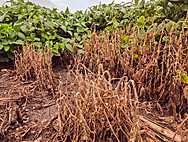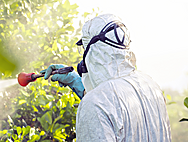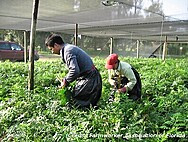For the first time in 40 years, the Environmental Protection Agency has taken emergency action to stop the use of a pesticide linked to serious health risks for fetuses. Tuesday’s emergency order applies to dimethyl tetrachloroterephthalate, also known as DCPA, a weedkiller used on crops such as broccoli, Brussels sprouts, cabbage and onions. When pregnant farmworkers and others are exposed to the pesticide, their babies can experience changes to fetal thyroid hormone levels, which are linked to low birth weight, impaired brain development, decreased IQ and impaired motor skills later in life. Mily Treviño Sauceda, executive director of Alianza Nacional de Campesinas, also known as the National Farmworkers Women’s Alliance, praised the agency’s action Tuesday, calling it “a great first step” to protect the reproductive health of farmworkers. Jeannie Economos, coordinator of the pesticide safety and environmental health program at the Farmworker Association of Florida, said the emergency order came too late for workers who have been exposed to DCPA for decades. Economos said she hopes that the EPA will ban more widely used, harmful pesticides and that the industry will move away from toxic agrochemicals.
Farmworker Health and Justice Team
We campaign for better working conditions, stronger health and safety regulations, and reduced toxic chemical exposures for farmworkers. Our collaborative working group- which includes farmworker advocates, healthcare professionals, health experts, scientists, and attorneys- is guided by the priorities and needs of farmworkers.
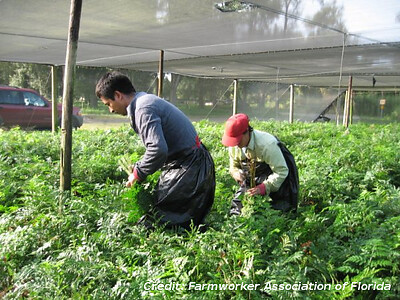 As we purchase food, Americans need to consider the harsh reality farmworkers face. Working outside, often in extreme heat for long hours, sometimes without access to shade, water, or restrooms—farmworkers labor in difficult and dangerous conditions.
As we purchase food, Americans need to consider the harsh reality farmworkers face. Working outside, often in extreme heat for long hours, sometimes without access to shade, water, or restrooms—farmworkers labor in difficult and dangerous conditions.
Farmworkers routinely come in contact with pesticides and other poisonous agricultural chemicals. In California alone, several hundred reports of farmworkers poisoned by pesticides are logged each year—and the illnesses reported nationwide are thought to be the tip of the iceberg. Nationally, there is no system to track reports of farmworkers poisoned by pesticides—but the number is thought to be in the tens of thousands.
In addition to immediate poisonings, farmworkers face long-term health impacts, such as elevated risks of cancer, birth defects, infertility, and neurological disorders as a result of exposure to hazardous pesticides. Farmworkers also “take home” pesticides on their clothing, footwear, and skin, exposing their families to these hazardous chemicals and their associated risk of causing sickness and other health impacts. Farmworkers are also exposed to many of the same toxic chemicals as the rest of us: in household products, in the food we eat, in drinking water, and pollution from chemical plants.
Our grassroots, frontline leadership has won substantial victories:
- We championed a regulation prohibiting dangerous pesticide applications by people under 18 years of age—who are at the greatest risk of suffering learning and developmental problems related to pesticide exposure.
- We helped develop policies to ensure workers who apply pesticides are properly trained to protect health and safety.
- We also played a key role in convincing the EPA to commit to banning chlorpyrifos, a widely used neurodevelopmental pesticide, which is linked to neurological damage in young children.
- We have successfully lobbied for pesticide labels to be printed in both English and Spanish via an accessible QR code, via the Pesticide Registration Improvement Act.
Key resources from experts and organizations in our network:
Exposed and at Risk: Opportunities to Strengthen Enforcement of Pesticide Regulations for Farmworker Safety (Report by the Center for Agriculture and Food Systems at Vermont Law and Graduate School, in partnership with Farmworker Justice, September 2022)
Pesticide Exposure and Childhood Cancer (Factsheet by Cancer Free Economy Network and Childhood Cancer Prevention Initiative, July 2022)
The Climate Crisis and Its Impacts on Farmworkers (Issue Brief by Farmworker Justice, May 2022)
Pesticides and Environmental Injustice in the USA: root causes, regulatory reinforcement and a path forward (Open access published study in BMC Public Health, by Nathan Donley, Robert Bullard, Jeannie Economos, Iris Figueroa, Jovita Lee, Amy K. Liebman, Dominica Navarro Martinez, and Fatemeh Shafiei, April 2022)
Farmworkers at Risk: The Growing Dangers of Pesticides and Heat (Report from the Union of Concerned Scientists, November 2019)
Videos
Spotlights and Testimonials
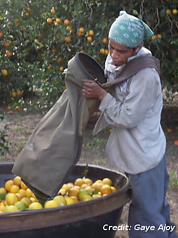
“We fed America all our lives,” said Geraldean Matthew, former Lake Apopka, Florida farmworker and a social and environmental justice leader. Geraldean passed away on September 3, 2016 after years of debilitating illnesses, including kidney failure and Lupus, and she felt these diseases were related to a lifetime of pesticide exposures. Geraldean was my hero. I can still hear her whispering in my ear; “I got your back.” I keep fighting for farmworkers because I must, for Geraldean’s sake and for the sake of other people in our communities, who risk themselves and their families’ health every day to feed all of us." Read more from Co-Coordinator of the FHJW team, Jeannie Economos.
The Farmworker Health and Justice Team is coordinated by:
Gabrielle Gonzales
Clean + Healthy
gabby@cleanhealthyny.org
Anne Katten
California Rural Legal Assistance Foundation
akatten@crlaf.org
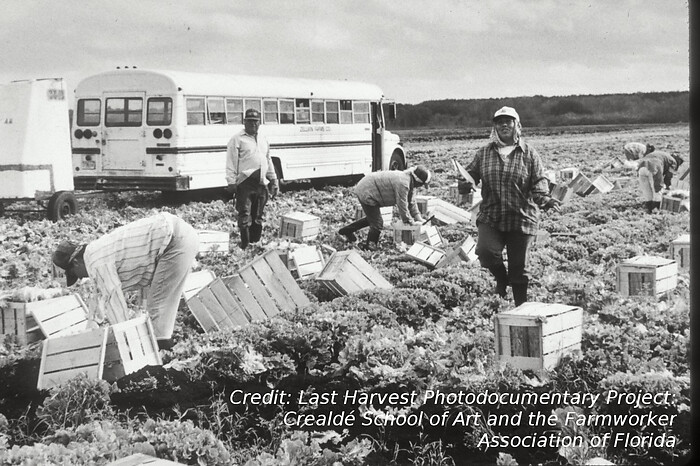
Farmworkers in the fields of central Florida





